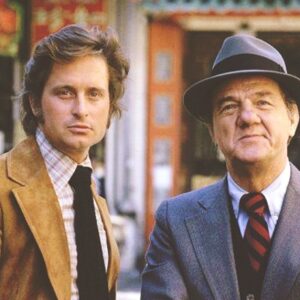Ah, the Coming-of-Age horror story. Who doesn’t love a good depiction of the clash between innocence and experience, of the crucible that is early adolescence, of the bittersweet, nostalgic pain that marks the beginning of maturity? The stakes are high, the characters recognizable, the lessons painful and relatable, and more often than not, the soundtrack banging.
But why is it when we say Coming-of-Age, we automatically think of stories like It, Something Wicked This Way Comes, or Stranger Things? What about the other ages we go through/come to? Where are those coming-of-age tales?
If you read the Foreword of my upcoming novel, Mary: An Awakening of Terror (and I sure hope you read the whole dang book, reader, because I think you’ll dig it), you’ll learn that one of the primary influences of the story is Stephen King’s coming-of-age nightmare, Carrie. The titles rhyme on purpose—in fact, Mary is something of a mirror image. Instead of being about the hell that is puberty, Mary is about that other hormonal rite of passage: menopause.
We don’t talk much about menopause as a culture. Hell, absent a few punchlines about “mid-life crisis,” we don’t talk much about middle age in general. But making it through middle age is just as much an accomplishment as making it through adolescence. If there’s one thing you learn as you get older, it’s that you never really know what the hell you’re doing. Every new stage of development is just as disorienting as the last and so that battle between innocence and experience never ends; it just changes arenas.
With that in mind, then, I decided to put together this list of other coming-of-age horror novels that aren’t about teenagerhood. And I’ll admit right off the bat, originally I was going to write a list of just middle-aged horror stories, but then as I tried to put titles together I remembered: oh right, I wrote Mary because there really aren’t many others. So I expanded the scope a bit for what you’re about to read. Once you add all the titles you don’t already own to your shopping cart, maybe you’ll wish I hadn’t. Sorry not sorry.
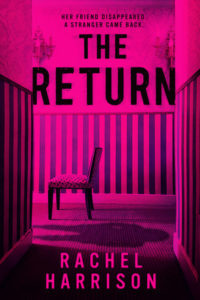
The Return, by Rachel Harrison
As I said at the top, the first thing most people probably think of when it comes to coming-of-age horror stories is kids on bikes. A key element to the subgenre is the friend group. Our friends are how we mark our own growth, as well as how we understand our place in the world—and as Stephen King, the post-Bradbury Pope of Coming-of-Age Horror Fiction himself said, “I never had any friends later on like the ones I had when I was twelve. Jesus, did you?” The answer to that question is no. But the same question could be asked about the friends you have in your 20s, and that answer just might be ‘no, and thank god.’ Our college-era friends know a very specific version of ourselves, and the friendships from that age that last are likely to be among life’s strongest. That’s where Rachel Harrison’s brilliant novel comes in. It explores the uniquely complicated dynamics of the friend group that crosses from late adolescence into adulthood: what it’s like when they start to make more money than you, start to be able to hang out in different ways than you can, start to get married, start to move past you. You all still have the same references—and have likely seen each other at your most pathetic and broken—but life starts taking you in different directions and turning you into new people. The Return’s depictions of that brutal, confusing, painful transition into Real Adulthood are no less harrowing than the more supernatural horrors that follow.
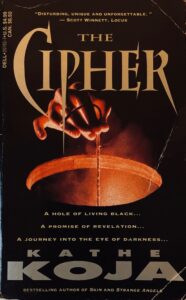
The Cipher, by Kathe Koja
Speaking of early adulthood, there’s no period quite so nihilistic as your twenties, is there? You’re on your own, you have the independence you so desperately craved as an teen, nobody can tell you what to do anymore … and life still sucks. Kathe Koja’s existential nightmare, The Cipher, is one of the best dramatizations of that directionless, horrible freedom. It’s tempting to call this book something like a Lovecraftian Clerks, but that makes it sound cute or derivative. The Cipher is neither of those things. It’s a bleak, unsparing story about trying to survive that early adulthood nihilism and learning that maybe there really is no rhyme or reason to the life, but that making peace with that truth is an essential milestone in our development.
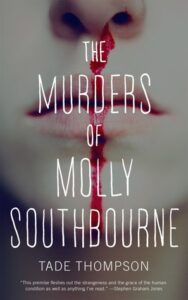
The Murders of Molly Southbourne, by Tade Thompson
Every time Molly Southbourne bleeds, she creates a clone of herself intent on killing her. Every scraped knee, every nosebleed … and then, there’s the added complication when she hits puberty. But Tade Thompson’s novella (itself the first of a trilogy) isn’t just a menstruation metaphor. It’s an unpredictable, ever-expanding narrative that always zigs when you expect it to zag. It’s about the slippery nature of self itself. It’s about the autophagy we all have to commit in order to grow and how, after a certain point, it’s impossible to keep track of who the “original” you ever even was.
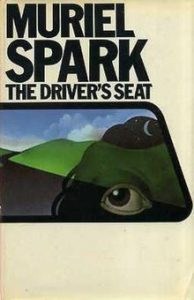
The Driver’s Seat, by Muriel Spark
A short, strange, dread-soaked novella about a 34-year-old woman coming into her own—her prime, if you’ll forgive the Muriel Spark pun—and paying the price. But is she paying it on purpose? This is an oblique, alienating whydunit about the mysteries of early-middle-adulthood, particularly the agoraphobic free-for-all of one’s thirties. There’s something remarkably disorienting about the age one comes into in one’s 30s. You’re still young, but you’ve never felt less so. Actual young people—with whom you’d identified only yesterday—now seem like some elaborate prank, with their slang and their references and their infantile faces (did we look that young when we were that age?!). You start to identify more with people you might have previously deemed “old,” and, as such, you start to understand how little time we truly have. This book, of course, takes that idea to quite an extreme, and can be read on a number of other levels, as well—but think of it as a Kafka-esque Looking for Mr. Goodbar. You can read it in a single sitting, but you’ll sit with it for much, much longer than that.

Queen of the Cicadas, by V. Castro
This book’s about a lot of things—revenge, racism, motherhood, cultural inheritance, Aztec mythology, and bugs, bugs, bugs. But the catalyst for the story is grounded in one middle-aged woman’s quest for purpose. Belinda Alvarez arrives at a farm to celebrate a childhood friend’s wedding, but she brings with her a loneliness and a restlessness that can only come after a marriage has failed, after a child has grown beyond your understanding. The wedding forces her to confront memories of childhood identity, of fashions that are now passe and laughable. She’s all too aware of her fillers, her middle-aged imperfections, her regrets and her displacement. Then she remembers an urban legend first told to her by her Grandmother that might have taken place at this very wedding venue, and she leaps at the occasion to investigate. The narrative begins to peel itself back, revealing generation after generation of trauma. You can’t help but remember that the most infamous breed of cicadas are cyclical insects. Belinda’s fears are all cyclical too.
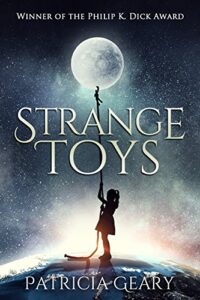
Strange Toys, by Patricia Geary
This is definitely a strange one, and it won’t be to everyone’s tastes. It’s kind of a compound coming-of-age tale, showing our protagonist Pet’s life at 9, at 16, and at 30. We see the ways she changes, the ways she doesn’t, and the (sometimes garish and surreal) ways the world insists on evolving around her. Throughout the narrative, she’s also on the hunt for her mysterious, magical sister, trying to prevent something (or things) horrible from happening to the rest of her family as her sister predicted. Pet must learn the extent of her weaknesses, the boundaries of her powers, and bend backward to face the past while the narrative pushes her ever into the future. It’s the sort of book you just gotta go with. Strange Toys won the Philip K Dick Award in 1987, and that feels appropriate because the narrative is fractal, confusing, ultimately unsatisfying if you’re looking for just story payoff, but also undeniably brilliant. It’s also full of bizarre characters, memorable moments, and a confounding energy, and, hey, if that ain’t life, I don’t know what is.
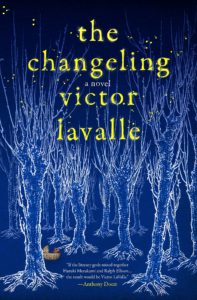
The Changeling, by Victor LaValle
Not everyone becomes a parent, and not everyone who does becomes a committed parent, but those that do are likely to agree that once it happens, your life gets divided into two distinct halves: Before and After. Perhaps LaValle’s brilliant, phantasmagoric, fantasy-horror epic isn’t exactly a coming-of-age story as it is a coming-into-a-new-identity story—but that’s what every new “age” is for us, isn’t it? Apollo Kagwa grew up without a father and, as such, he’s extra determined to be there for his baby son. For an all-too-brief moment, it seems like all Apollo’s dreams have come true. He has the perfect love, the perfect life … and then it all goes to hell. If there’s one thing every coming-of-age story has, it’s that moment where you finally have to reassess everything you thought you knew. This book has that in buckets. It’s a book about grief and dizzying fear and instability and discovery, but also about forgiveness and revelation and being unable to see the world in the same way once you learn some hard—even impossible—truths.
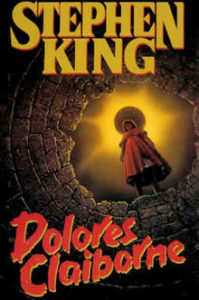
Dolores Claiborne, by Stephen King
Come on, I had to rep King here somewhere, right? Shakespeare’s Jacques tells us that the seventh and final age awaiting us all is “second childhood and mere oblivion.” But King posits that, if we’re lucky (that is, if we haven’t fallen prey to any of the myriad life-ending calamities featured in his other works), we just might make it to the Fuck It age. That’s the age where you say Fuck It to pretense and just tell the truth, no matter how unpleasant it may be, because you’ve survived too much and you’re too damn tired to do otherwise. King’s titular character Dolores doesn’t begin her journey quite there yet, but her difficult relationship with her wealthy, unsparing employer, Vera Donovan, helps her find that place. This novel is a stylistic departure for King in that it’s told as one long, unbroken monologue as Dolores is brought in for questioning after Vera is found dead at the foot of her stairs. Along the way, we learn the truth of the other murder Dolores has long been suspected of: that of her horribly abusive husband, Joe. This has long been one of my sleeper favorites of King’s. It’s sad, angry, dark, funny, burning with incandescent love for his own hardscrabble mother. It’s also somehow filled with that same bittersweet nostalgia—for the person we were, the person we might have become, the person we fought like hell to be, the person who survived—as It or The Body or any other prototypical kids-on-bikes coming-of-age tale King ever conceived. Because whether you’re a preteen fighting an interdimensional killer clown or an aging woman confronting abuse, we’re all making our way through the dark as best we can … and changing along the way.
(Incidentally, I first experienced this book in the 90s via the audiobook read by Frances Sternhagen. It’s a perfect combination of story, medium, and performer. I highly recommend it. And you know what’s also a great audiobook? Mary: An Awakening of Terror. It’s read by Susan Bennett, and she full on transforms into the character of Mary, as well as Mary’s delightfully obscene Aunt Nadine. You should check it out.)
***

















